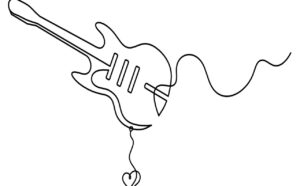GENRE: Pop/R&B
LABEL: Section1
REVIEWED: 19th September, 2025
Mikaela Straus, better known as King Princess, returns with her third album Girl Violence, a raw and provocative project that embraces anger, chaos, and unapologetic sexuality. Where sapphic pop has often been framed in terms of longing or bliss, Straus pushes the boundaries by diving into disillusionment and queer rage, proving the genre has room for more jagged emotions.
It has been three years since her last full-length release, and the pop landscape has changed in her absence. Artists like Reneé Rapp, Billie Eilish, and a wave of queer performers have taken sapphic storytelling into the mainstream. King Princess, never content to be boxed into the label of “queer music,” re-emerges into this environment with a sound that is sharper and more defiant. Girl Violence carries the charge of confrontation: lust remains sacred, but it comes laced with warning. The album feels like the soundtrack to a relationship gone up in flames, told through witty threats, sly admissions, and guttural screams.
From the outset, Straus leans fully into her long-touted rock star persona. While her earlier records dabbled in rock influences alongside R&B, funk, and electro-pop, here the guitars, snarls, and grit dominate. On “Cry, Cry, Cry,” her voice scrapes against the production with a venom that’s part Lucinda Williams, part Miley Cyrus. “Get Your Heart Broken” blurs the lines between seduction and danger, with Straus’s gravelly delivery underscoring the risks of intimacy. On “Girls,” she teases the temptation of rekindling an old flame, equal parts warning and invitation. These songs prove that Straus has the vocal muscle and the charisma to inhabit the swaggering role that critics have long associated with her image.
What distinguishes Girl Violence from her earlier albums is its thematic cohesion. The record lives in the liminal space where attraction meets destruction, where pleasure and pain overlap. Straus’s voice morphs from playful to exhausted to vulnerable, giving the project a lived-in authenticity. The interlude “Say What You Will,” featuring Joe Talbot of Idles, is a haunting highlight that drifts into glitchy ambience, showing Straus’s willingness to stretch form while maintaining emotional intensity.
The album also marks a shift behind the scenes. For the first time, Straus parted ways with longtime collaborator Mark Ronson, releasing Girl Violence outside of his Columbia imprint. Instead, she teamed with producers Jake Portrait and Aire Atlantica, who inject more distortion, edge, and atmosphere. At times the production veers into indulgence—such as the cinematic swell of the title track—but when it locks in, the result is compelling, as on “Slow Down and Shut Up,” a punchy anthem built for live stages.
Much of the record’s energy is fueled by Straus’s personal upheavals, including two major breakups: her professional split from Ronson and the end of her relationship with director Quinn Whitney Wilson. Listeners looking for tenderness won’t find much of it here Girl Violence is about messy aftermaths and the persona of a scorned rock star. Straus doesn’t shy away from painting herself as part of the chaos, though critics might wish she explored her own accountability more deeply.
Still, Girl Violence succeeds as a confident, bruised, and brash statement. It shows King Princess fully leaning into her edge, unafraid to snarl, seduce, or scandalize. The result is an album that cements her as a singular voice in modern pop-rock an artist who finds power in imperfection, and allure in the wreckage.





